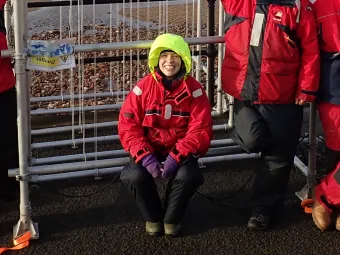
As sea level rise accelerates, there is a greater need to protect those living closest to our coasts.
Historically, coastal management strategies, such as the building of sea walls, have been reactive to extreme events. Now, more sustainable adaptive management strategies are sought.
This new approach provides an opportunity for novel technologies and tools to be developed that support coastal hazard managers in their decision-making process.
For this month’s Scientist Spotlight, we spoke to Dr Jenny Brown from the Marine Physics and Ocean Climate (MPOC) group at NOC to explore her leading role in coastal oceanography.
What is your role at NOC?
As a physical oceanographer, I conduct coastal research to determine how changing conditions, in the natural and built environment, may impact peoples’ lives and livelihoods. In my role at NOC I lead, and contribute to, a number of projects to investigate the uncertainties in flood and coastal erosion hazard prediction and, more broadly, ways in which we can more sustainably manage the coast. In order to do this, I work with others monitoring and modelling coastal hazards to better understand past events and present-day interactions to reduce uncertainty in forecasting capability and future projections, which are crucial evidence bases to support decisions surrounding coastal management. I’m often out and about at events showcasing NOC’s emerging technologies and raising awareness of coastal hazards with ‘hands on’ science demos.
What drew you to working in this area?
The central question in my research is: how can we improve coastal predictions to support shoreline management activities? In the UK we have established shoreline management practices and hazard forecast services, but historically we have been reactive to extreme events. Nowadays we aim to be proactive building more resilient coastal schemes that work with natural processes.
To be resilient many ‘what if?’ scenarios need to be factored in to hazard management plans, while effective response plans are needed when an event occurs. Planning scenarios consider rising sea level, climate variability and also societal behaviours and change. A good way to explore future conditions and provide near real-time event information is by using predictive tools, modelling studies or monitoring networks. Due to the vast range of different coastal types and human interventions, locations very often have unique characteristics and requirements. Research into different digital technologies to generate information for numerous locations is thus required. For the information to then be applied the uncertainties in generating the data must be understood and quantified. This requires detailed investigation into process interactions and their impacts and feedbacks. Ultimately, all of this understanding informs a variety of socioeconomic cost-benefit decisions that determine the management actions and response taken at our coastline.
What science are you currently working on?
Currently, I am working in a team to develop a new sensor to measure dense wave spray that can shoot over or overtop sea defences during windy conditions. Wave overtopping is not only a flood hazard, but is also hazardous to people due to the speed of the water travelling over a sea defence, or due to the debris it may also be carrying over the sea defence from the beach. By developing a new sensor to measure the speed and volume of these dense spray plumes we will be able to better calibrate flood forecasting services and be able to nowcast hazard information to infrastructure operators, for example, those running coastal transport networks.
By using observations to identify uncertainties in numerical predictions, new rules and equations can be formulated based on the measurements for site-specific management needs. These needs might be: the design of a new coastal scheme, reducing delays and cancelations in the transport industry, or responding to events for public safety.
What is your favourite thing about the work you do?
I love the fact every research project is different, so every day is a learning day! The difference might be the location I’m working in or the people I’m working with. It is very common for research teams to represent many science, engineering and data management disciplines and span physical, biogeochemical and socioeconomic interests. With the growing need for science engagement I’ve also recently started to work with those from an arts background. Every coastal location also comes with different partnership opportunities. Very often coastal researchers work with government agencies, local authorities, commercial industry, community groups and charities.
I really enjoy co-ordinating teams of different people from all career stages. Together our research has the potential to make a difference by translating findings into usable outcomes for those delivering and developing sustainable coastal management options and policies.
What impact does your science have on society?
Where aging sea defences exist or more natural solutions are being seeded, coastal research can deliver new technologies to monitor protection levels and resilience as society learns to adapt to rising sea levels and changing storminess. While understanding extreme conditions is still important, there is also an increasing focus on the more frequently occurring hazards that impact our daily routines. For example, onshore winds during the highest tides can cause hazardous wave overtopping when conditions are not considered as stormy. In locations where overtopping can impact people, property, or critical infrastructure, temporary access restrictions or barriers may need to be implemented for protection. To optimise safety responses, it is critical to have access to accurate forecast and nowcast information. This is where interdisciplinary research into observational, predictive and data sharing capability can play a pivotal role in managing and living with coastal hazard.
Learn more about NOC’s coastal walk
Support NOC
We are the UK’s leading ocean research charity, and our coastal experts are at the forefront of research, and providing evidence for decision makers. Whether your passion is combating climate change, protecting ocean life, or equipping the next generation, you can have a direct impact by supporting world leading ocean research and innovation.
Explore partnering with us through the Ocean Alliance or make a gift today.